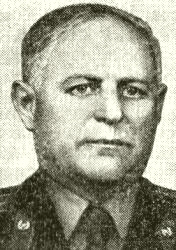Iosif Serper was born in 1911 in Odessa. His father was a worker. He graduated from a general education school and a FZU (factory training school), and then worked as a turner at an Odessa factory. From 1933 to 1935 he served in the Red Army for the first time, in 1939 he was mobilized again. Serper took part in the Winter War against Finland and in the "liberation" of Bessarabia, i.e., the campaign that annexed that Romanian province to the Soviet Union.
From the first days of the German-Soviet [Romanian-Soviet] war, Serper saw action as the commander of a sapper platoon. While continuing to fight, his regiment retreated eastward. In the summer of 1942, near Rostov-on-Don Serper was shell-shocked and captured by the Germans. In a German POW camp, he was identified as a Jew by one of his own soldiers. The camp guard to whom his identity was revealed and who worked with the local police severely beat Serper, but did not kill him.
On the fourth day of his captivity, Serper was invited to join a group of the POWs that was planning to escape from the camp. As part of this group of 300 men, Serper escaped from the POW camp. With great difficulty, he and some comrades reached the front. There it became clear that the crossing from the German to the Soviet side was no less difficult than escaping from the POW camp. More than half of those who had escaped were killed by stepping on Soviet laid mines. The approximately one hundred men who succeeded in crossing the front line were arrested by osobists (NKVD men) and disarmed. Serper and the other arrestees faced the perspective of being sent to the Gulag or being executed. The circumstance that saved them was the fact that they had escaped collectively, in Soviet uniforms, and managed to provide themselves with weapons in the way.
A short court martial sentenced Serper to service in a penal battalion. Serper was wounded in one of its first battles. That exempted him from further service in a penal battalion. Therefore, after being released from hospital, he returned to a regular army unit.
Serper was first recommended for the title of Hero of the Soviet Union after the capture of Donetsk. The HQ of the Front, however, did not accept the recommendation on the grounds that Serper had been in enemy's captivity. However, Serper did received the Order of the Red Star. He was nominated for the Hero honor for the second time after the re-capture of Zaporozhie. This time too he was only awarded the Order of the Red Banner. After the capture of Melitopol – a very difficult military operation – the Command decided to award the title of Hero of the Soviet Union to every soldier or officer who distinguished himself in that battle. That is how Captain Serper, who succeeded in destroying twelve enemy tanks with his "mobile" anti-tank mines in the streets of Melitopol finally became a Hero of the Soviet Union.
Pravda wrote on him on November 24, 1943 as follows:
"One block after another, the town was liberated. In the course of the fighting for the town, the storm-infantry led by captain Serper proceeded to force its way through the streets to the railway station. They captured the most difficult points. Where they passed, enemy mines and centers of resistance disappeared, armored bunkers together with their garrisons were exploded."
Serper ended his short memoir with the words: "I believe that I succeeded in settling accounts with the fascists."
After the war, Serper returned to Odessa, where he worked at various factories. In 1989, together with his children, he emigrated from the USSR and settled in the USA.
Serper died in San-Francisco in 2002.







